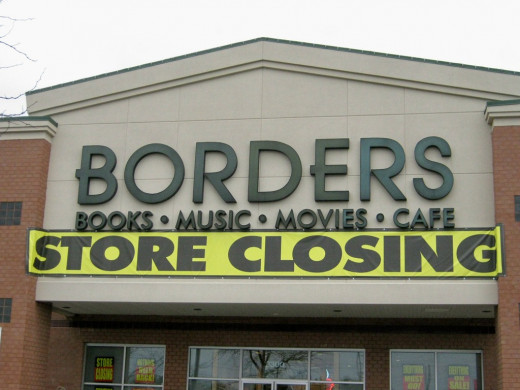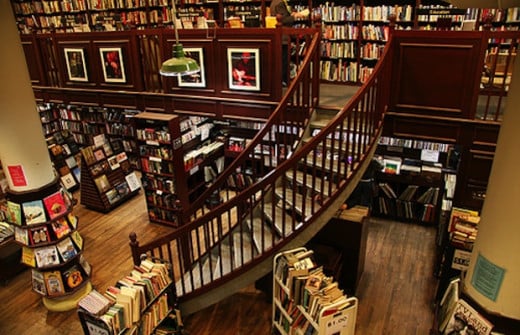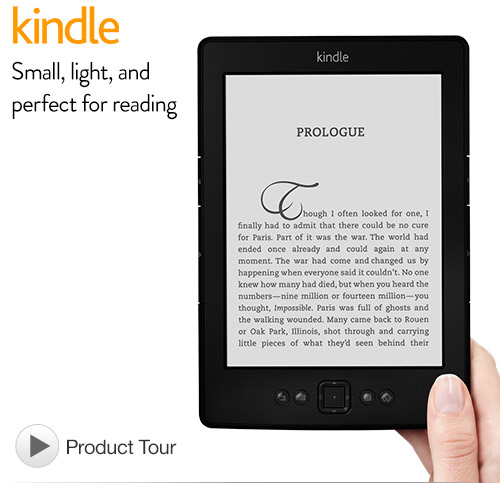Are Bookstores Disappearing?
Is Borders only the first to go?

Book Hubs: An Endangered Species

What Bookstores Offer
Bookstores are not just libraries with more permanent decisions. Bookstores have a range of other benefits many people either don't know about or take for granted.
1.) Bookstores are hubs for people who like to discover new authors, as writer for the New York Times Emily Powell argues. While a library may have that copy of the new Young Adult (YA) novel, you may not discover it at all on your own unless you're either 'in the know' or until someone gives you a suggestion. At a bookstore, a new book's debut is advertised, the author might even be there, and there are people flocking about to a particular section in excitement.
2.) Bookstores are as friendly as libraries towards kids. Libraries help foster the want to read in kids. But with no library cards to carry, and no late fees to worry about, there is a charm to bookstores equal to that of libraries. There is usually retail associated with their favorite series, such as toys, coloring books and videos having to do with their literary taste - Ramona Quinby, The Magic Treehouse or How to Train Your Dragon for example that are also likely to attract a possible reader's attention.
3.) In some cases bookstores have a greater variety in stock than libraries. Bookstores carry other accessories that book-lovers like; things like calendars, journals, notebooks, paper crafts. These are things often overlooked as you walk to the checkout counter, but they are things you are unlikely to find in a library. You certainly can't 'gift' library books. That would be like trying to gift something from Blockbuster.
And we all know what happened to them.
Why People Think Bookstores are Disappearing
.An article by The Atlantic was posted in January of this year (2014) stating that American readers are on the decline, and that because on the whole people are reading less, that there isn't quite the demand for books anymore. Seattle has been known for being one of America's most literate cities, and with the disappearance of many of its book stores, it can be an understandable conclusion that this was because people are not reading as much anymore as in previous years.
Why This is Misleading
While it's probably true that people are not reading as much. Reading less, rather than being the cause, is actually most likely the symptom. Since the economy has become so difficult to wade through, one should be pointing the finger in the other direction. My mother is a 5th grade English teacher, and her students always complain that there aren't enough bookstores in their town of Wilton, CT, a town in Fairfield County with a fantastic academic record, and whose medium household income is, according to Wikipedia, $153,770. In fact, my mother always has to go to our hometown's library to pick up books for her students to use because it has the largest selection. If Wilton, CT is feeling the effects of this decline in bookstores, imagine how much harder the metaphorical hammer has struck in less wealthy places.
With a decrease in availability in books and places from which to buy them, is it any wonder we as a nation are reading less? The increase in technology has something to do with it, but it's not the whole answer.Think of how much time the average person spends on the Internet - between the Business Insider and Ask.com it's approximately somewhere between 13-23 hours weekly. While the Business Insider would argue that technology is decreasing person-to-person interaction, they fail to take into account that Internet "leisure time" can also include browsing news articles, online books for school or not, and even social networking. Technically speaking, all those are forms of reading, even if it's just Buzzfeed and not a volume of Hawthorne.
The majority of people reading less are also past college age. There is a required amount of reading done in America's education system, but the downward slope of reading begins after that; how many people still maintain a reading 'regiment' after their requirement to read stops. I feel that people, in reaction to budget-cutting and sliced worker's pay and hours are adjusting their finances accordingly. With less money to work with, books happen to fall under the unfortunate category of what gets cut.
Overall, I would actually argue that people are reading more, but perhaps only quantitatively and not qualitatively. Book reading may be suffering, but with the treasure trove of knowledge the Internet brings, one could argue people are reading more than ever.
eBooks > Paper books?

So Why Are They Disappearing?
There are several reasons, several factors at work that make unfortunately make owning a bookstore increasingly difficult:
1.) Monopolies. Amazon and Barnes & Noble are cashing in on the book industry. Many people would argue that the new eBook trend is what's phasing out the paper book, but that's only part of the picture. Yes, there is a new way to read that doesn't require a physical book, and that probably affects how people attain books - avoiding the bookstore entirely. But there is another piece to this...piece of the puzzle.
What Amazon and Barnes & Noble are doing are phasing out other bookstores because they are popular and successful. Borders is gone because of bad economic decisions made by the company itself, but yet B & N survives. Independent bookstores can't always compete with big name corporations that sell the same books as they do, and they certainly can't always competitively price the same books and hope to win. You can purchase new releases on Amazon for market price, or you can buy used books for as cheap as $.01 or one cent. One cent for a book. You would literally pay 5,000% more for shipping than the actual book. This comes down to the consumer, and we as consumers have chosen to follow the cheapest price and to buy our books at the best deal. With our financial decisions, we have collectively decided what businesses stay and what businesses go. Is this then our fault? Partly. It's hard to say, considering we only want to maintain our previous lifestyles in a new, terrifying economy that is so unbalanced and relatively unstable that it's no wonder that we gravitate towards the bigger, safer corporations to satisfy our wants.
2.) The Economy
The American economy seems like the scapegoat excuse for all our problems these days, but that isn't because we deemed it so like Patrick Stewart on Star Trek. The recession is so pervasive, that its influence can be felt in nearly all corners of daily life. Imagine a giant octopus sinking into a hole, and in struggling for a handhold, it pulls up what it snatches like plucking weeds from a garden into the oblivion along with it. In a figurative sense, this is what has been happening, to local businesses especially. Large businesses have been able to survive, being either "too big to fail" or rich enough to compensate and adapt quickly. But smaller businesses - like bookstores - are feeling the worst hardship. In major cities like New York and Seattle, bookstores are being forced out of business due to rising rent costs,
What Can We Do?
There are a few things one can do to help combat this, but the efforts are best made in numbers.
1.) Read more. Even if you buy a kindle, read Google Books, or even if you reread what's already in your collection, read them. Reading is a great exercise for the brain and keeps your mind sharp. It keeps up your critical thinking skills and can keep you informed about the world and about people - the authors or otherwise. This is not just fueling your need to visit bookstores, but it's helping your overall mental health.
2.) Visit bookstores in person. Even if you know what you want, and how much you're willing to pay for it, it wouldn't hurt to look for it regardless. If there's a bookstore near you and you're not sure if they have what you want, stop there anyway. Bookstores, especially small ones or used bookstores, have staff that are willing to help you, to suggest books you may not have even known were things you would be interested in, and even if they can't find that book you came in for, you'll more than likely be glad you came anyway. Purchases help them, but a visit can help you.
3.) Keep talking about it. The more people realize that bookstores are going extinct, and the more they realize how much of a loss it is to the general public, the more likely people are going to do something about it. Advertising, social networking, and using technology to your advantage can help.
4.) Break the 'Unspoken Rule of Book Lovers' and see the movie first. If a book-based movie is released and you are interested in seeing it but haven't read the source, do it anyway. If you see it and enjoyed it, you will more likely pick up the book if you see it in a bookstore. I often fall into the trap of waiting to read the book before seeing the movie and often get to doing neither. By doing this you're not only opening yourself to a new book possibility, you're also supporting the author by seeing the movie, and the bookstore by investigating the source.






